The Health bulletin [serial] - University of North Carolina at Chapel Hill
The Health bulletin [serial] - University of North Carolina at Chapel Hill
The Health bulletin [serial] - University of North Carolina at Chapel Hill
You also want an ePaper? Increase the reach of your titles
YUMPU automatically turns print PDFs into web optimized ePapers that Google loves.
August, 1927 <strong>The</strong> <strong>Health</strong> Bulletin 15<br />
tween one o'clock and three o'clock,<br />
especially toward the l<strong>at</strong>ter part <strong>of</strong><br />
August, the baby should have a light<br />
cover to protect from the chill present<br />
<strong>at</strong> th<strong>at</strong> time <strong>of</strong> year. If the whole<br />
family diet is largely restricted to<br />
fresh vegetables and fruit and to<br />
fresh milk and cold w<strong>at</strong>er for drinks,<br />
and if as much time is spent as possible<br />
outdoors, there will be less irrit<strong>at</strong>ion<br />
and fretfulness and reaction<br />
against the baby. A gre<strong>at</strong> many<br />
people know these things and may<br />
consider the repetition <strong>of</strong> such talk<br />
in these columns a waste <strong>of</strong> time and<br />
money. On the other hand, there<br />
are many thousands <strong>of</strong> people in the<br />
St<strong>at</strong>e who very seldom, if ever, stop<br />
to think about such questions; and it<br />
is for these people and for the benefit<br />
<strong>of</strong> their babies th<strong>at</strong> we keep reiter<strong>at</strong>ing<br />
such things.<br />
THE INFANT'S SECOND SUMMER<br />
As the hot we<strong>at</strong>her approaches,<br />
hundreds <strong>of</strong> mothers are dreading<br />
their infant's "second summer." It<br />
is unreasonable to assume th<strong>at</strong> Providence<br />
has decreed th<strong>at</strong> the second<br />
summer <strong>of</strong> a baby's life should be its<br />
most strenuous period. <strong>The</strong>refore,<br />
seme cause other than Divine decree<br />
should be sought. <strong>The</strong> real cause is<br />
easily found.<br />
During the first summer the baby<br />
k<br />
is either breast-fed or is fed boiled<br />
milk with scrupulous care from boiled<br />
bottles and nipples. In the second<br />
summer the baby is allowed strained<br />
cereals, mashed and strained vegetables,<br />
me<strong>at</strong> broth, eggs, crisp bacon,<br />
etc. With the advent <strong>of</strong> the more<br />
liberal diet there is a tendency to<br />
feel th<strong>at</strong> the baby has passed beyond<br />
the period <strong>of</strong> infant care, and a letup<br />
in the minutiae <strong>of</strong> infant feeding<br />
technic develops. <strong>The</strong> mother is in<br />
a hurry; the milk is not boiled; the<br />
cereal is not cooked quite long<br />
enough; the vegetables are not<br />
mashed; the baby is permitted to<br />
come to the table and the f<strong>at</strong>her<br />
feels th<strong>at</strong> no harm would result from<br />
sucking a chicken bone, and maybe<br />
the next day a ham bone; and so it<br />
goes. <strong>The</strong> deadly ice cream cone is<br />
encouraged in many circles, and the<br />
infant's total daily supply <strong>of</strong> sweets<br />
is notably increased.<br />
In a recent study <strong>of</strong> six hundred<br />
and twenty-eight normal white infants<br />
under two years <strong>of</strong> age from<br />
the Baltimore Welfare Clinic, Wilkins<br />
has collected st<strong>at</strong>istics tipon the incidence<br />
<strong>of</strong> summer dysentery and diarrhea.<br />
Of the children, who were<br />
observed from June to November,<br />
1925, more than half had no gastrointestinal<br />
disturbances wh<strong>at</strong>ever.<br />
Twenty-seven per cent, had diarrhea,<br />
and 7.6 per cent, or more had dysentery.<br />
One-fourth <strong>of</strong> the infants were<br />
exclusively breast-fed. Of these, only<br />
10 per cent, had diarrhea, and none<br />
had dysentery.<br />
Fifty-four per cent, <strong>of</strong> the infants<br />
developed gastro-intestinal disease in<br />
some form during the second summer,<br />
and only 34 per cent, in the first<br />
summer. Dysentery appeared to be<br />
one <strong>of</strong> the most common infectious<br />
diseases <strong>of</strong> the non-breast fed.<br />
Wilkins investig<strong>at</strong>ed the method <strong>of</strong><br />
protection <strong>of</strong> infants against dysentery<br />
by oral administr<strong>at</strong>ion <strong>of</strong> vaccines,<br />
for which results have elsewhere<br />
been claimed. <strong>The</strong> vaccin<strong>at</strong>ed<br />
infants developed dysentery as readily<br />
as the unvaccin<strong>at</strong>ed ; and so the <strong>at</strong>tempt<br />
to vaccin<strong>at</strong>e in this way was<br />
entirely unsuccessful. However, agglutinins<br />
were demonstr<strong>at</strong>ed in the<br />
blood <strong>of</strong> rabbits which had been fed<br />
large doses <strong>of</strong> killed Flexner dysentery<br />
bacilli, which shows th<strong>at</strong> organisms<br />
administered orally can affect<br />
the serum defense reactions.<br />
By these st<strong>at</strong>istics <strong>of</strong> children<br />
among the poorer classes then, the<br />
old wives' fear <strong>of</strong> the second summer<br />
appears to be justified. Many more<br />
children suffered from gastro-intestinal<br />
conditions in the second summer<br />
than in the first. <strong>The</strong> picture <strong>of</strong> the


![The Health bulletin [serial] - University of North Carolina at Chapel Hill](https://img.yumpu.com/33495252/245/500x640/the-health-bulletin-serial-university-of-north-carolina-at-chapel-hill.jpg)
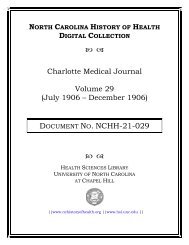
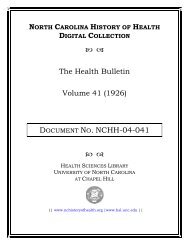
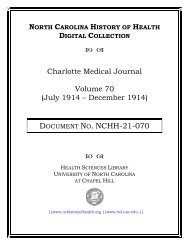
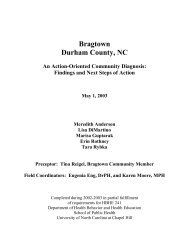
![Bulletin of the North Carolina Board of Health [serial] - University of ...](https://img.yumpu.com/48032016/1/153x260/bulletin-of-the-north-carolina-board-of-health-serial-university-of-.jpg?quality=85)
![The Health bulletin [serial] - University of North Carolina at Chapel Hill](https://img.yumpu.com/47603625/1/169x260/the-health-bulletin-serial-university-of-north-carolina-at-chapel-hill.jpg?quality=85)
![The Health bulletin [serial] - University of North Carolina at Chapel Hill](https://img.yumpu.com/47242858/1/169x260/the-health-bulletin-serial-university-of-north-carolina-at-chapel-hill.jpg?quality=85)
![The Health bulletin [serial] - University of North Carolina at Chapel Hill](https://img.yumpu.com/43204263/1/172x260/the-health-bulletin-serial-university-of-north-carolina-at-chapel-hill.jpg?quality=85)
![The Health bulletin [serial] - University of North Carolina at Chapel Hill](https://img.yumpu.com/41981074/1/163x260/the-health-bulletin-serial-university-of-north-carolina-at-chapel-hill.jpg?quality=85)
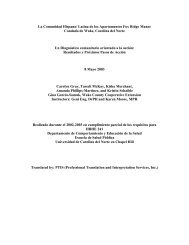
![The Health bulletin [serial] - University of North Carolina at Chapel Hill](https://img.yumpu.com/40912928/1/164x260/the-health-bulletin-serial-university-of-north-carolina-at-chapel-hill.jpg?quality=85)
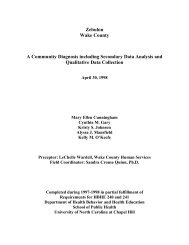
![The Health bulletin [serial] - University of North Carolina at Chapel Hill](https://img.yumpu.com/35643061/1/167x260/the-health-bulletin-serial-university-of-north-carolina-at-chapel-hill.jpg?quality=85)
![Biennial report of the North Carolina State Board of Health [serial]](https://img.yumpu.com/34024350/1/166x260/biennial-report-of-the-north-carolina-state-board-of-health-serial.jpg?quality=85)
